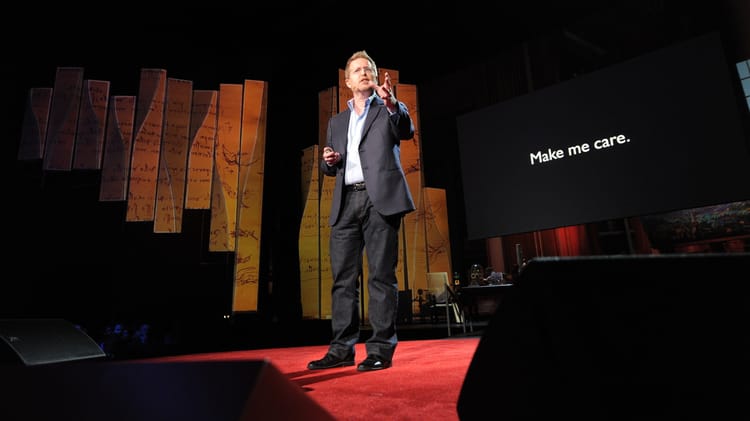“The Clues to a Great Story” by Andrew Stanton
• public
Table of contents
Stanton shares insights from his experience as a storyteller, emphasizing the importance of engaging audiences through relatable characters and elements of curiosity, anticipation, and surprise.
For Key Ideas, Questions and Quotes from this talk, you can scroll below.
Andrew Stanton gave this speech at the TED Conference. All rights to the speech and the video above belong to TED.
About Andrew Stanton
Andrew Ayers Stanton (born December 3, 1965) is an American filmmaker and voice actor based at Pixar, which he joined in 1990. (Source: Wikipedia)
Key Ideas From Talk
I have been interested in writing for a long time, which indirectly led me to become interested in storytelling as well. Writing is actually telling a story for me. That's why when I see content related to storytelling, it immediately catches my attention. I was curious about the ways to become a good storyteller and that's why I watched Andrew's speech. Besides being worth watching, I really liked these insights in his talk;
- Make the audience care: Stanton emphasizes the importance of creating characters and situations that evoke empathy from the audience. By making the audience care about the characters and their journey, you can keep them engaged throughout the story.
- The power of storytelling in revealing truth: Stanton believes that storytelling is not just about entertainment but also about revealing truth. He encourages storytellers to use their stories to explore universal human experiences and emotions, allowing the audience to connect on a deeper level.
- The importance of keeping the audience's interest: Stanton discusses the concept of "wonder" and its role in storytelling. He suggests that by piquing the audience's curiosity and keeping them engaged, you can create a sense of wonder that keeps them invested in the story.
- Create a well-defined structure: Stanton emphasizes the need for a clear and well-defined structure in storytelling. He encourages storytellers to establish a strong beginning, middle, and end, with a clear central theme that drives the narrative forward.
- Use the power of anticipation: Stanton highlights the effectiveness of building anticipation in storytelling. By setting up questions or conflicts and gradually revealing answers, you can keep the audience engaged and invested in the outcome.
- Appeal to both logic and emotion: Stanton believes that a great story should engage both the audience's intellect and emotions. By combining logical and emotional elements, you can create a more well-rounded and compelling narrative.
- Embrace the concept of "emotional truth": Stanton discusses the importance of conveying emotional truth in storytelling. He suggests that even in fictional stories, the emotional core should be authentic and relatable, allowing the audience to connect with the characters and their experiences.
- Craft a memorable and satisfying ending: Stanton emphasizes the significance of a strong ending in storytelling. He suggests that a great story should deliver a satisfying resolution that fulfills the emotional journey of the characters and leaves a lasting impact on the audience.
Questions to Ask Ourselves
- How effectively am I making my own stories or personal experiences relatable and engaging to others?
- Am I using storytelling to explore and express universal truths or emotions that resonate with people, or am I holding back?
- How curious and open-minded am I when it comes to exploring new ideas and incorporating wonder into my storytelling?
- How well-structured are my narratives, and do they have a clear beginning, middle, and end that drive the story forward?
- How successful am I at building anticipation and suspense in my storytelling to keep the audience engaged and invested?
- Am I effectively balancing intellectual and emotional appeal in my storytelling, or am I leaning more towards one side?
- How authentic and truthful are my stories, even if they are fictional, in conveying genuine emotions and experiences?
- Are my story endings memorable and impactful, leaving a lasting impression on the audience?
Notes From Talk
Related List and Guide
This talk is a part of following list: "Talks That Changed My Perspective".
